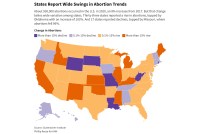Latest KFF Health News Stories
Comienzan a estar disponibles audífonos de venta libre desde $199
Los audífonos de venta libre cuestan menos en parte porque no incluyen los servicios de un experto para una evaluación auditiva, ajuste y afinación del dispositivo. En cambio, los nuevos dispositivos deben ser configurados por los propios consumidores.
Say What? Hearing Aids Available Over-the-Counter for as Low as $199, and Without a Prescription
The cheaper over-the-counter aids are for adults with mild to moderate hearing loss — a market of tens of millions of people, many of whom have until now been priced out because prescription devices can cost thousands of dollars.
Journalists Dig In on the Fiscal Health of the Nation and Hospital Closures in Rural Missouri
KHN and California Healthline staff made the rounds on national and local media this week to discuss their stories. Here’s a collection of their appearances.
Centene Agrees to Pay Massachusetts $14 Million Over Medicaid Prescription Claims
Massachusetts is the latest state to settle with St. Louis-based Centene Corp. over allegations that it overcharged Medicaid prescription drug programs.
Buy and Bust: After Platinum Health Took Control of Noble Sites, All Hospital Workers Were Fired
Two Missouri towns are without operating hospitals after private equity-backed Noble Health left both facilities mired in debt, lawsuits, and federal investigations. The hospitals’ new operator, Platinum Health, agreed to buy them in April for $2 and laid off the last employees in early September.
Centene to Pay $166 Million to Texas in Medicaid Drug Pricing Settlement
Texas is at least the 12th state to settle with St. Louis-based Centene Corp. over allegations that it overcharged Medicaid prescription drug programs.
Private Equity Sees the Billions in Eye Care as Firms Target High-Profit Procedures
As private equity groups are swarming into aging America’s eye care, the consolidation is costing the U.S. health care system and patients more money.
California and New York Aim to Curb Diet Pill Sales to Minors
California and New York would be the first states to require anyone under 18 to obtain prescriptions to purchase over-the-counter weight loss products, which some research has linked to eating disorders.
When Does Life Begin? As State Laws Define It, Science, Politics, and Religion Clash
For decades, the U.S. medical establishment has adhered to a legally recognized standard for brain death, one embraced by most states. Why is a uniform clinical standard for the inception of human life proving so elusive?
Buy and Bust: Collapse of Private Equity-Backed Rural Hospitals Mired Employees in Medical Bills
The U.S. Labor Department investigates Noble Health after former employees of its shuttered Missouri hospitals say the private equity-backed owner took money from their paychecks and then failed to fund their insurance coverage.
Cognitive Rehab May Help Older Adults Clear Covid-Related Brain Fog
People whose brains have been injured by concussions, traumatic accidents, strokes, or neurodegenerative conditions such as Parkinson’s disease can benefit from targeted therapy. Experts also employ therapies for long-covid patients with memory and language problems.
Las clínicas de salud sexual luchan sin medios contra la viruela del simio
Las clínicas que tratan las enfermedades de transmisión sexual —que ya se enfrentaban a un aumento explosivo de enfermedades como la sífilis y la gonorrea— se encuentran ahora en la primera línea de la lucha para controlar el brote de viruela del simio, que crece rápidamente.
Fighting Monkeypox, Sexual Health Clinics Are Underfunded and Ill-Equipped
Sexual health clinics are scrambling to properly track, test, and treat hundreds of monkeypox patients. So far, it isn’t going well.
Conservative Blocs Unleash Litigation to Curb Public Health Powers
Spurred on by opposition to pandemic-related health mandates, a coalition of religious liberty groups, conservative think tanks, and Republican state attorneys general has filed a cascade of litigation seeking to rein in the powers of public health authorities.
Three-Year Abortion Trends Vary Dramatically by State
About 930,000 abortions occurred in the U.S. in 2020, an 8% increase from 2017. But that nationwide figure belies dramatic variation among states — disparities expected to magnify in the wake of the Supreme Court’s decision to strike down Roe v. Wade.
Five Things to Know Now That the Supreme Court Has Overturned Roe v. Wade
By undoing that landmark decision, the law of the land since 1973, the court has empowered states to set their own abortion restrictions — so where people live will determine their level of access.
Buy and Bust: When Private Equity Comes for Rural Hospitals
Noble Health swept into two small Missouri towns promising to save their hospitals. Instead, workers and vendors say it stopped paying bills and government inspectors found it put patients at risk. Within two years — after taking millions in federal covid relief and big administrative fees — it locked the doors.
Race Is Often Used as Medical Shorthand for How Bodies Work. Some Doctors Want to Change That.
Physicians have long believed it’s good medicine to consider race in health care. But recently, rather than perpetuate the myth that race governs how bodies function, a more nuanced approach has emerged: acknowledging that racial health disparities often reflect the effects of generations of systemic racism, such as lack of access to stable housing or nutritious food.
Caskets Wrapped in Colorful Images Pay Tribute to Young Lives Lost to Trauma and Violence
Mourners are wrapping caskets in imagery, similar to the way companies wrap logos around cars, trucks, and buses. Across the country, casket-wrap companies create custom designs, too often for grieving parents who have lost their children to gun violence.
A un año de recibir millones del gobierno federal, los estados apenas han comenzado a pensar cómo utilizar el dinero que recibieron para zanjar la desigualdad en salud que generó, y agravó, la pandemia.
























